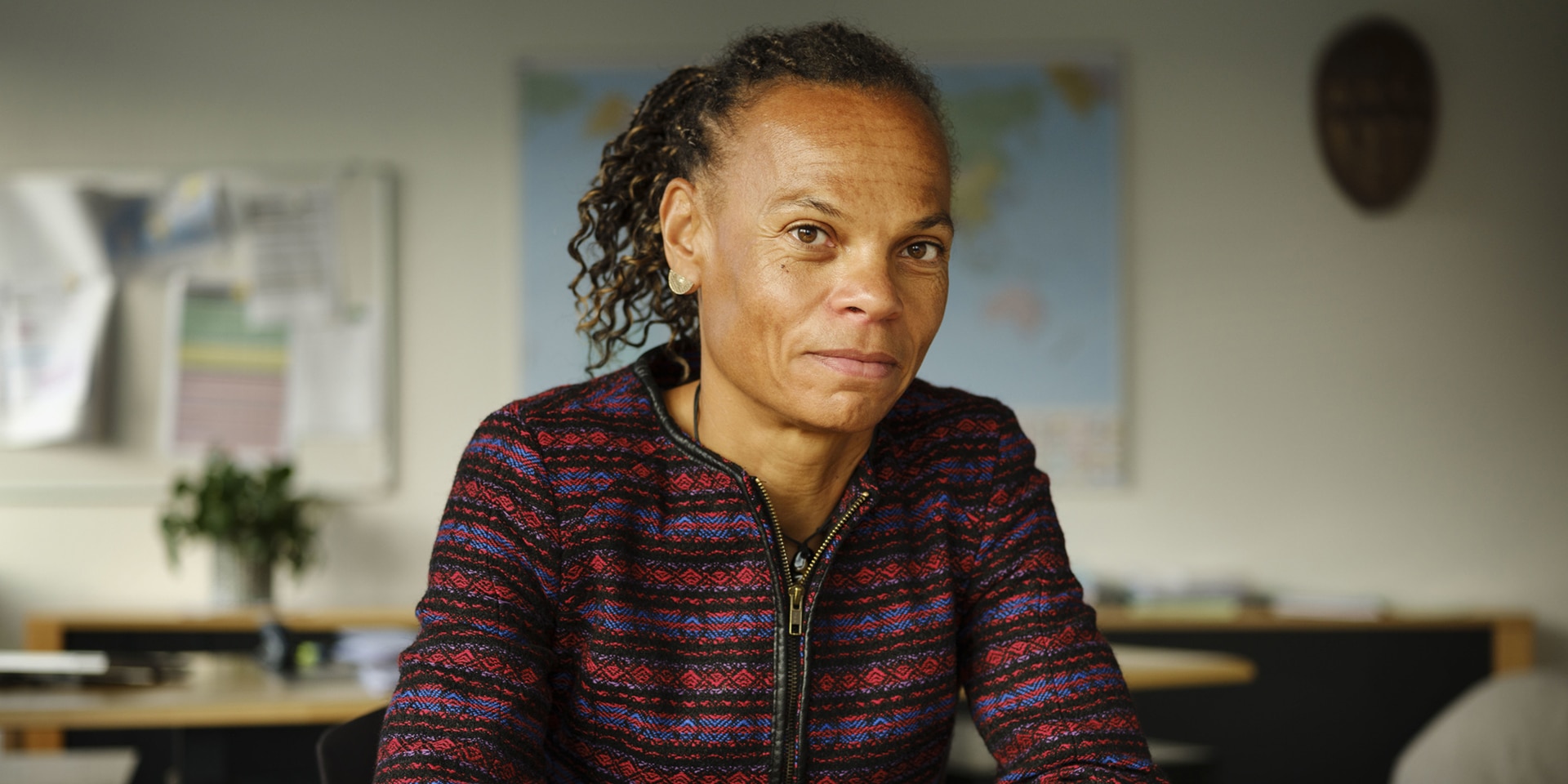"Sustainable development would not be possible without business"
SDC Director General Patricia Danzi talks about the role of the private sector in international cooperation, explains how the new guidance regulates cooperation, and highlights how the involvement of businesses in achieving the Sustainable Development Goals is ultimately a win-win situation for all. A conversation about poverty reduction, equal opportunities and human dignity.

SDC Director General Patricia Danzi talks about the role of the private sector in international cooperation, about ending poverty and about human dignity. © Keystone
Ending global poverty is one of the UN's 17 Sustainable Development Goals and a core component of Switzerland's International Cooperation Strategy. Given that the private sector creates nine out of ten jobs in developing countries, it clearly plays an important role in achieving this. Jobs create opportunities for people locally and help reduce poverty in affected countries. Responsible companies can also create innovative and sustainable products that bring about lasting improvements to people's lives, such as technologies to harness renewable energies and new medicines to tackle deadly diseases.
To expand on its strategy in the area of private sector engagement, the Swiss Agency for Development and Cooperation (SDC) has drawn up a handbook and guidelines. SDC Director General Patricia Danzi talks about why Switzerland is relying on the private sector in its international cooperation and why the drafting and publication of the new guidelines are important for sustainable partnerships.
Why does the private sector play an important part in development cooperation?
Sustainable development would not be possible without business, as otherwise there would only be support through subsidies. If we look at the UN's 17 Sustainable Development Goals, it's clear that our goals are hugely ambitious. It's not about supplying a village with water, it's about safeguarding water resources for the whole planet. Achieving these ambitious goals requires money. And we can't do this as a country alone. The private sector can be a helpful partner here, not only because of the additional financial resources, but because businesses can often free up funds more quickly, as we have seen during the fight against COVID-19. This speed and flexibility is invaluable in development cooperation.

So businesses primarily provide financial support?
We shouldn't consider development cooperation purely from the donor perspective, but focus instead on the needs of our partner countries. What do those affected need and what will help them in the long term? If you ask people on the ground about their greatest challenges, you frequently hear about unemployment and a lack of prospects. Many countries face major demographic challenges, which mean young people with no qualifications, no jobs and ultimately no prospects. This is where Switzerland can help – whether through its experience in vocational skills development, by promoting the local private sector, or by improving the economic conditions. Private sector engagement means engaging with the needs of partner countries and their populations.
So it's not just about money, it's more about helping people lead independent lives?
If a person loses everything in a war, is dependent on humanitarian aid for decades, and ends up living in a refugee camp, at some point they lose their dignity. They can't even feed their own family. An element that is too often forgotten but that is incredibly important is that if you give someone the opportunity to take back control of their lives, you can also give them back some dignity.
To what extent can the private sector be a sparring partner in this area?
The more people are able to integrate in a small but efficient economy, the better the population will fare. What's more, the private sector can reach population groups that would otherwise slip through the net. Let's take the example of a single woman who plants seeds in a small field to grow crops to feed her family and to sell at the market. Thanks to local business partners, the woman would get access to a small loan, and would learn to manage her finances independently, understand the local banking system and invest. She would get to know the market, and using a smartphone would be able to better plan her work, e.g. find out when rain is forecast or when is a good day to sell the crops at the market. Many women find running a small business comes naturally. Small things can make a real difference and can make a lasting improvement to the situations of individual population groups.
The role of local businesses is widely known. But what interests do large multinationals have in development cooperation?
Basically the same ones: eliminating poverty. But for a different reason. While the SDC primarily seeks to resolve social and development problems, the business sector is more concerned with reducing poverty to increase the spending power of the middle class.

So for the private sector it's mainly about market expansion?
For the private sector, this is far from being just about market expansion, it's also about customers at home. The demand for sustainable products is growing – from coffee and chocolate to clothes – so when companies improve their sustainability credentials by committing to the SDGs, their reputations also get a boost. Sustainability is becoming a key selling point. Clearly communicating the relevant goals from the outset is key. And this is not only important for the SDC, but also for businesses. There are significant barriers to investment in developing countries: local interest rates are high and returns are low to begin with. Planning must have a local and long-term focus. Cooperation with the local business sector is also vitally important for multinationals, for example to reduce the interest rate burden with local financial institutions. At the same time, the private sector must have an interest in investing in the sales market in the long term, as only then will there be a lasting and worthwhile return on their investment.
The SDC has been working with the private sector for a long time. Two official documents – a handbook and a set of guidelines – have just been published for the first time to support this cooperation. Why now?
Our main objective was to provide clarity. Clarity for the public, for potential partners, but also for ourselves. On the one hand, we wanted to put together a clear and informative overview of the guidelines and control mechanisms that already exist, while on the other, we wanted to develop a checklist for cooperation projects. This is important so that we can manage expectations on both sides before a project gets under way – both here in Switzerland and for employees locally. What's more, we are now working with a more independent body that screens interested economic partners in detail before we embark on cooperation projects. The SDC has always done this, but now we can rely on an additional external analysis.
The new documents break down private sector engagement into four areas of activity. Where was the greatest need for clarity?
Collaboration with the private sector is nothing new, either for the SDC or in development cooperation more broadly. The importance of a functioning local economy has long been known. Since it was founded 60 years ago, the SDC has been working with local private sector actors in its development cooperation, and most NGOs rely on cooperation with economic partners to implement their projects. We also work closely with other departments in international cooperation. The State Secretariat for Economic Affairs (SECO) in particular is an important partner – both due to its expertise in creating the right framework conditions and its extensive network of businesses. The areas with the greatest need for clarity are the role of the regional and multinational private sector, and Switzerland's public procurement. This is also where we see the most misunderstandings – and not only with our partners, but also domestically.
What does the SDC hope to achieve in this area with these new documents – particularly in Switzerland itself?
Switzerland's International Cooperation Strategy takes a systematic approach. And we wanted to replicate this for cooperation with the private sector. Transparent dialogue about aims, conditions and mutual expectations is crucial if we want to avoid unnecessary frustration. The consultation on the strategy showed that there are many questions and preconceptions, particularly with regard to the private sector – for example a fear that development funds will end up in the pockets of multinationals. These preconceptions have no basis in reality. Instead, both partners can work together on joint projects. By publishing the handbook and guidelines, the SDC has put these basic principles down in writing and made them accessible for all. A working basis has been created to allow all stakeholders to speak openly and in a fact-based manner. It's important that we're all on the same page, and all speak the same language.
Does this mean we've solved all the problems and that with the private sector we can end global poverty?
Neither state institutions, nor the private sector nor NGOs can end global poverty. If we want to deliver on the ambitious Sustainable Development Goals, all development partners, need to work together. Business cannot lift everyone out of poverty; while jobs are important, they are no panacea. We also see this in economically developed countries, such as here in Switzerland, where not everyone has a job and where other institutional safety nets are needed to help people. Some population groups need other measures – that may be subsidies, integration schemes, or measures at multilateral level. However, one thing is clear: the private sector plays a key role in delivering on the SDGs – particularly for larger projects. Ultimately, everyone benefits if there is greater awareness of sustainable development in the private sector and businesses can contribute their expertise to this development.
Documents
- General Guidance on the Private Sector in the context of the International Cooperation Strategy 2021–24 (PDF, 16 Pages, 682.3 kB, English)Leitbild Privatsektor im Rahmen der Strategie für internationale Zusammenarbeit 2021–2024
Principes directeurs relatifs au secteur privé dans le cadre de la stratégie de coopération internationale 2021–2024
Principi guida relativi al settore privato nel quadro della strategia della cooperazione internazionale 2021–2024 - SDC Handbook on Private Sector Engagement (PDF, 80 Pages, 8.4 MB, English)
- Brochure: Switzerland's International Cooperation Strategy 2021–24 (PDF, 52 Pages, 1.3 MB)



